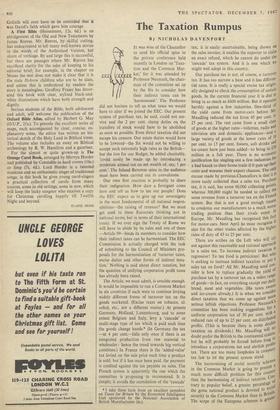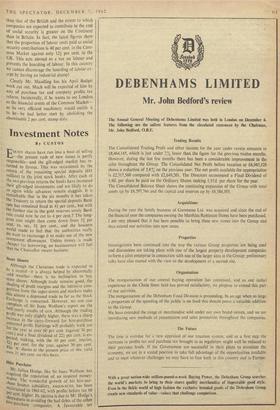The Taxation Rumpus
By NICHOLAS DAVENPORT IT was wise of the Chancellor to send his official spies to the private conference held
recently in London on 'Taxa- tion and the Common Mar- atzz ket,' for it was attended by
Professor Neumark, the chair- their indirect taxes can be have to alter if we joined the EEC. Our present system of purchase tax, he said, could not sur- vive and the 2 per cent. stamp duties on the transfers of stock would have to be abolished as soon as possible. Even direct taxation did not escape his censure. Our estate duties would have to be lowered—the Six would not be willing to accept such extremely high rates as the British— but the loss for our Budget, he added charitably, `could easily be made up by introducing a moderate annual tax on net wealth of, say, 1 per cent.' The Inland Revenue spies in the audience must have been carried out in convulsions.
Our own first reaction is probably to share their indignation. How dare a foreigner come here and tell us how to tax our people! Does the EEC expect us to give up our sovereignty in the most fundamental of all national respon- sibilities—the raising of revenue? But we must get used to these Eurocrats thinking not in national terms, but in terms of their international treaty. If we ever sign the Treaty of Rome we will have to abide by its rules and one of them —Article 99—binds its members to consider how their indirect taxes can be harmonised. The EEC Commission is actually charged with the task of submitting to the Council of Ministers pro- posals for the harmonisation of 'turnover taxes, excise duties and other forms of indirect taxa- tion.' Nothing is said about direct taxation, but the question of unifying corporation profit taxes has already been raised.
The Article, we must admit, is sensible enough. It would be impossible to run a Common Market in six countries if each were to continue levying widely different forms of turnover tax on the goods marketed. (Excise taxes on tobacco, al- cohol, etc., are a different matter.) At present Germany, Holland, Luxembourg, and to some extent Belgium and Italy, levy a 'cascade' or multi-stage type of tax which is paid each time the goods change hands.* (In Germany the tax —at 4 per cent.—falls only once if there is an integrated production from raw material to wholesaler: hence the trend towards big vertical combines.) In France there is the 'added-value' tax levied on the sale price each time a product is sold; but if it has once been paid, the payment is credited against the tax payable on sales. The French system is apparently the one which the committee is proposing to recommend. It is simple; it avoids the cumulation of the 'cascade'
* I take these facts from an excellent pamphlet on Taxes for Britain by the Economist Intelligence Unit sponsored by the National Association of British Manufacturers (6s.).
tax; it is easily ascertainable, being shown on the sales invoice; it enables the exporter to claim
an exact refund, which he cannot do under the `cascade' tax system. And it is one which we might well adopt in this country.
Our purchase tax is not, of course, a turnover tax. It has too narrow a base and it has differen-
tial rates. It is really a special excise tax origin' ally designed to check the consumption of certain goods. In the current financial year it is due to
bring in as much as £600 million. But it operates harshly against a few industries. One-third of the yield came from motor-cars before Mr Maudling reduced the tax from 45 per cent. In 25 per cent. The rest came from a small class of goods at the higher rates—toiletries, radio and television sets and domestic appliances—and 3 large variety of goods at the lower rates of lt), per cent. to 15 per cent. Sweets, soft drinks and ice-cream have just been added—to bring in £5° million in a full year. There is no economic justification for singling out a few industries for a bad knock to their home trade if it puts up their costs and worsens their export chances. The onlY excuse made by previous Chancellors is that it is more easily collected than a sales tax. Purchase tax, it is said, has some 60,000 collecting points' whereas 300,000 might be needed to collect the same revenue from a turnover tax on the French system. But that is not a good enough reason to condemn our manufacturers to a much worse trading position than their rivals enjoY in Europe. Mr. Maudling has recognised this fact for motor-cars. Next April he must recognise it also for the other trades affected by the higher rates of duty of 45 to 25 per cent. There are scribes on the Left who will cry out against this reasonable and rational approacll to a sales tax. To increase indirect taxation is regressive! To tax food is pernicious! But who is seeking to increase indirect taxation or put 3 sales tax on food? All Mr. Maudling need coni sider is how to replace gradually the yield of purchase tax by a turnover tax on a wider range of goods—in fact, on everything except our dallY bread, meat and vegetables. (He taxes sweets and ice-cream already.) It is when we consider direct taxation that we come up against more serious leftish objections. Professor Neumark' committee has been making suggestions for 3 uniform corporation tax of 50 per cent. with a, reduced rate of up to 25 per cent. on distributed profits. (This is because there is some double taxation on dividends.) Mr. Maudling will no doubt prefer the British to the continental sysler11' but he will probably be forced before long I0 introduce a corporations tax and abolish profits tax. There are too many loopholes in company tax law to let the present system stand. The harmonising of social security scheines in the Common Market is going to present `` much more difficult problem for this country than the harmonising of indirect taxation. C0°- trary to popular belief, a greater percentage of the gross national product is devoted to soc.nial, security in the Common Market than in Britain' The scope of the European schemes is greater than that of the British and the extent to which Companies are expected to contribute to the cost of social security is greater on the Continent than in Britain. In fact, the latest figures show that the proportion of labour costs paid as social security contributions is 40 per cent. in the Com- mon Market against only 121 per cent. in the UK. This acts abroad as a tax on Tabour and prevents the hoarding of labour. In this country we cannot discourage the hoarding of labour ex- cept by having an industrial slump!
Clearly Mr. Maudling has his April Budget work cut out. Much will be expected of him by way of purchase tax and company profits tax reform. Incidentally, if he wants to see London as the financial centre of the Common Market— as its very efficient machinery would entitle it to be—he had better start by abolishing the abominable 2 per cent. stamp duty.







































 Previous page
Previous page